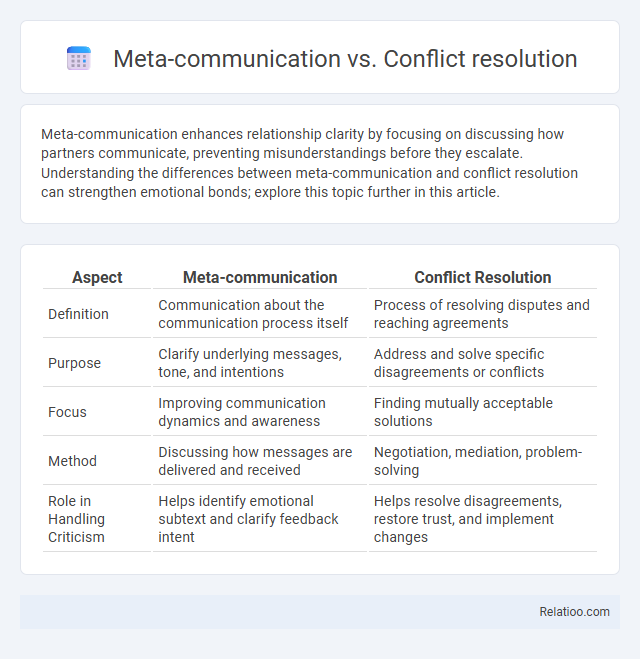Meta-communication enhances relationship clarity by focusing on discussing how partners communicate, preventing misunderstandings before they escalate. Understanding the differences between meta-communication and conflict resolution can strengthen emotional bonds; explore this topic further in this article.
Table of Comparison
| Aspect | Meta-communication | Conflict Resolution |
|---|---|---|
| Definition | Communication about the communication process itself | Process of resolving disputes and reaching agreements |
| Purpose | Clarify underlying messages, tone, and intentions | Address and solve specific disagreements or conflicts |
| Focus | Improving communication dynamics and awareness | Finding mutually acceptable solutions |
| Method | Discussing how messages are delivered and received | Negotiation, mediation, problem-solving |
| Role in Handling Criticism | Helps identify emotional subtext and clarify feedback intent | Helps resolve disagreements, restore trust, and implement changes |
Understanding Meta-Communication: An Overview
Understanding meta-communication involves recognizing the underlying messages and contextual cues beyond the spoken words, essential for effective conflict resolution. Meta-communication guides individuals in interpreting tone, body language, and implied meanings, thereby reducing misunderstandings during disputes. Mastering meta-communication enhances emotional intelligence and fosters clearer, more constructive interactions in conflict resolution processes.
Defining Conflict Resolution in Interpersonal Settings
Conflict resolution in interpersonal settings involves strategies and techniques aimed at addressing and resolving disagreements to restore harmony and understanding between individuals. Meta-communication plays a crucial role by allowing parties to discuss their communication patterns, clarifying misunderstandings and underlying emotions. Unlike conflict resolution, which focuses on solving the dispute, meta-communication enhances the overall interaction by improving how people communicate about their conflicts.
Key Differences Between Meta-Communication and Conflict Resolution
Meta-communication involves the underlying messages, tone, and context behind the words, helping clarify intentions and prevent misunderstandings. Conflict resolution focuses on actively addressing and solving disputes through negotiation, compromise, or mediation techniques. Understanding meta-communication enhances Your ability to interpret unspoken cues, while conflict resolution provides structured methods to resolve disagreements and restore harmony.
The Role of Meta-Communication in Effective Communication
Meta-communication plays a crucial role in effective communication by providing a framework for understanding the underlying context, emotions, and intentions behind verbal exchanges, which enhances clarity and reduces misunderstandings. Conflict resolution benefits from meta-communication as it allows parties to openly address communication patterns and emotional cues, facilitating empathy and collaborative problem-solving. Integrating meta-communication techniques within conflict resolution strategies improves mutual awareness and supports the development of constructive dialogue.
How Meta-Communication Influences Conflict Resolution
Meta-communication plays a crucial role in conflict resolution by enabling parties to understand the underlying emotions, intentions, and context behind verbal messages, which helps clarify misunderstandings and reduce tensions. By addressing how messages are delivered and interpreted, meta-communication facilitates more effective dialogue and mutual empathy, leading to constructive problem-solving. This layered communication approach enhances transparency and trust, creating a foundation for resolving disputes more efficiently and sustainably.
Practical Strategies for Meta-Communication During Conflict
Practical strategies for meta-communication during conflict include openly discussing the underlying emotions and intentions behind your words, which helps clarify misunderstandings and de-escalate tension. You can use reflective listening to confirm what the other person is expressing, fostering empathy and reducing defensive reactions. By addressing the communication process itself, you enhance conflict resolution and create a constructive dialogue that moves beyond surface-level disagreements.
Benefits of Integrating Meta-Communication into Conflict Resolution
Integrating meta-communication into conflict resolution enhances clarity by encouraging parties to express underlying emotions and intentions, reducing misunderstandings. This approach fosters empathy and active listening, enabling more effective problem-solving and sustainable agreements. Utilizing meta-communication promotes self-awareness and transparency, which are critical for resolving conflicts constructively and preventing future disputes.
Common Barriers to Meta-Communication in Conflict Scenarios
Common barriers to meta-communication in conflict scenarios include emotional defensiveness, unclear language, and assumptions that hinder open dialogue. Your ability to recognize and address these barriers enhances conflict resolution by fostering mutual understanding and reducing misunderstandings. Effective meta-communication requires conscious effort to clarify intentions and create a safe space for honest expression during conflicts.
Real-Life Examples: Meta-Communication Versus Traditional Conflict Resolution
Meta-communication involves discussing how you communicate, which clarifies misunderstandings before they escalate, such as when partners explicitly address tone and intent during disagreements. Traditional conflict resolution typically focuses on resolving the issue at hand after tensions rise, like mediating a negotiation to find a compromise. Your ability to use meta-communication in real-life scenarios fosters deeper understanding and prevents conflicts from recurring, unlike traditional methods that may only address immediate problems.
Choosing the Right Approach: When to Use Meta-Communication or Conflict Resolution
Choosing between meta-communication and conflict resolution depends on the nature of the interpersonal issue; meta-communication works best for clarifying underlying communication patterns and preventing misunderstandings, while conflict resolution targets active disputes requiring negotiation and problem-solving. Meta-communication is effective in early-stage conflicts or ambiguous interactions by promoting awareness about how messages are conveyed and received. Conflict resolution should be employed in escalated situations where parties need structured dialogue to reach mutually acceptable agreements and restore relationship harmony.

Infographic: Meta-communication vs Conflict resolution
 relatioo.com
relatioo.com